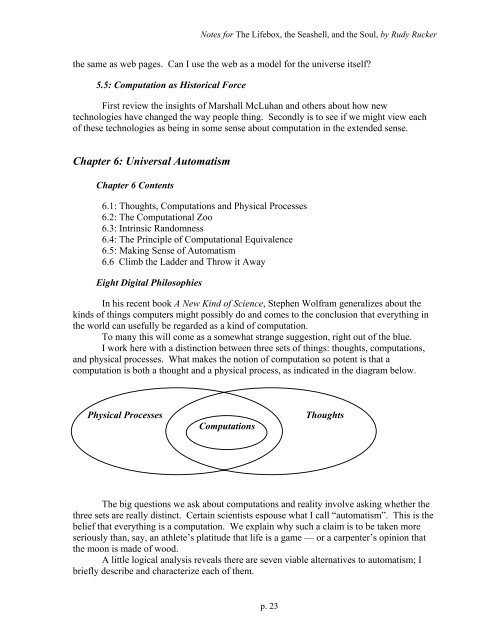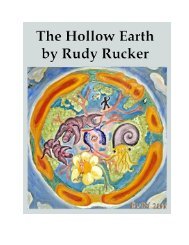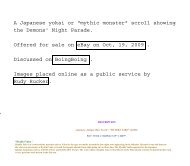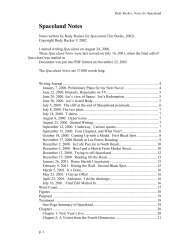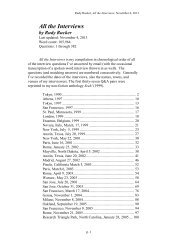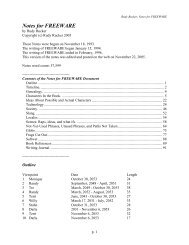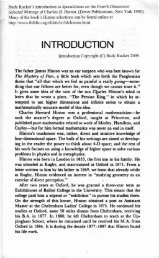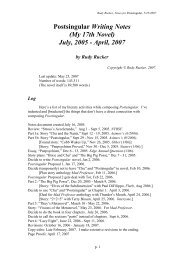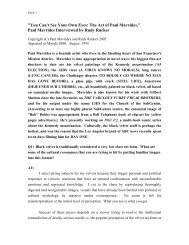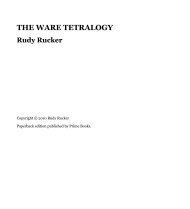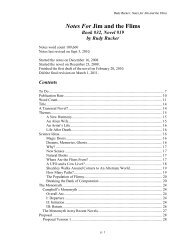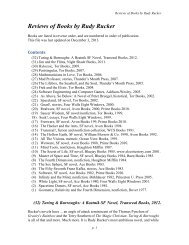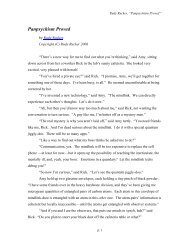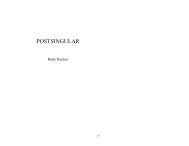Notes for the Lifebox, the Seashell, and the Soul - Rudy Rucker
Notes for the Lifebox, the Seashell, and the Soul - Rudy Rucker
Notes for the Lifebox, the Seashell, and the Soul - Rudy Rucker
You also want an ePaper? Increase the reach of your titles
YUMPU automatically turns print PDFs into web optimized ePapers that Google loves.
<strong>Notes</strong> <strong>for</strong> The <strong>Lifebox</strong>, <strong>the</strong> <strong>Seashell</strong>, <strong>and</strong> <strong>the</strong> <strong>Soul</strong>, by <strong>Rudy</strong> <strong>Rucker</strong><br />
<strong>the</strong> same as web pages. Can I use <strong>the</strong> web as a model <strong>for</strong> <strong>the</strong> universe itself?<br />
5.5: Computation as Historical Force<br />
First review <strong>the</strong> insights of Marshall McLuhan <strong>and</strong> o<strong>the</strong>rs about how new<br />
technologies have changed <strong>the</strong> way people thing. Secondly is to see if we might view each<br />
of <strong>the</strong>se technologies as being in some sense about computation in <strong>the</strong> extended sense.<br />
Chapter 6: Universal Automatism<br />
Chapter 6 Contents<br />
6.1: Thoughts, Computations <strong>and</strong> Physical Processes<br />
6.2: The Computational Zoo<br />
6.3: Intrinsic R<strong>and</strong>omness<br />
6.4: The Principle of Computational Equivalence<br />
6.5: Making Sense of Automatism<br />
6.6 Climb <strong>the</strong> Ladder <strong>and</strong> Throw it Away<br />
Eight Digital Philosophies<br />
In his recent book A New Kind of Science, Stephen Wolfram generalizes about <strong>the</strong><br />
kinds of things computers might possibly do <strong>and</strong> comes to <strong>the</strong> conclusion that everything in<br />
<strong>the</strong> world can usefully be regarded as a kind of computation.<br />
To many this will come as a somewhat strange suggestion, right out of <strong>the</strong> blue.<br />
I work here with a distinction between three sets of things: thoughts, computations,<br />
<strong>and</strong> physical processes. What makes <strong>the</strong> notion of computation so potent is that a<br />
computation is both a thought <strong>and</strong> a physical process, as indicated in <strong>the</strong> diagram below.<br />
Physical Processes<br />
Computations<br />
Thoughts<br />
The big questions we ask about computations <strong>and</strong> reality involve asking whe<strong>the</strong>r <strong>the</strong><br />
three sets are really distinct. Certain scientists espouse what I call “automatism”. This is <strong>the</strong><br />
belief that everything is a computation. We explain why such a claim is to be taken more<br />
seriously than, say, an athlete’s platitude that life is a game — or a carpenter’s opinion that<br />
<strong>the</strong> moon is made of wood.<br />
A little logical analysis reveals <strong>the</strong>re are seven viable alternatives to automatism; I<br />
briefly describe <strong>and</strong> characterize each of <strong>the</strong>m.<br />
p. 23


